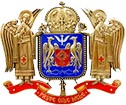

His Beatitude Daniel, Patriarch of Romania, participated Monday, 4 April 2016, at the solemn festivity of the Romanian Academy dedicated to the 150thanniversary since its foundation.
During this event, the following personalities delivered speeches: Academician Ionel-Valentin Vlad, president of the Romanian Academy; His Excellency Mr. Klaus Iohannis, President of Romania; Her Royal Highness Crown Princess Margareta of Romania; Călin Popescu Tăriceanu, President of the Senate of Romania; His Beatitude Daniel, Patriarch of Romania and honorary member of the Romanian Academy; Prof. Dr. Adrian Curaj, Minister for National Education and Scientific Research. Congratulatory messages were read out on behalf of other European Academies.
Academician Ionel Valentin Vlad opened the festive event by presenting the course of the institution during the past 150 years.
On the 150thanniversary in the service of the Romanian nation, the Romanian Academy remains, as Great Nicolae Iorga said: the Academy of today, as the Academy of yesterday, and the future one looks at the future being fully confident in the virtues and the power of life of the nation. The main role of the Romanian Academy is, without any doubt, that of protecting our identity, i.e. her profound and unrepeatable spiritual values, taking also into the account the current trends of the development of humanity.
This is why, from the development projects of Romania in the long term, about 20 years for example, the Romanian Academy rests to achieve one of the most important project. It is the project related to Romanian culture, seen between national and universal, with well-defined objectives in the areas of education and teaching, in attracting to the culture of the population of this country, especially the young generation – which today has other targets, and often wrongly understand science – in the electronic culture, in affirming the contribution of Romanian scientists and cultural personalities to the universal science and culture, to the broad culture of humanity, Academician Ionel Valentin Vlad said.
Romanian President Mr. Klaus Iohannis reiterated the importance of a solid education provided by the Romanian Academy.
I am glad to see that the Romanian Academy has engaged in an endeavor of analysis and strategical forecasting in the middle term for a range of important areas of the economic and social life. I have supported and will encourage in the future the role that the Romanian Academy can play to coagulate and multiply the creative capacities of the nation.
Through its honorary members, through the contact it develops between the scientific communities home and abroad, the Academy represents Romania as an important participant in the dialogue between cultures. The Academy is also a real, respected and credible ambassador of the nation’s intellectual capabilities, contributing to the increase of Romania’s prestige worldwide. Along with all these appreciations and thoughts, mister President, and honorable members of the Academy, I wish you many years, much strength in your work and ambitious projects.
In his turn, His Beatitude Patriarch Daniel reaffirmed the close tie between the Academy and the Church, as well as the role played by the religious personalities who have marked the academic life and research.
The 150thanniversary of the Romanian Academy (1866-2016) is a significant moment in the Romanian scientific and cultural life, an occasion to pay tribute to the founders and personalities who honoured this representative scientific and cultural forum of Romania, knowing the role of the Romanian intellectual elite especially in the cultivation of the national consciousness and the endeavour of national unity, resulting in building the modern Romanian state.
The anniversary motto: “150 years in the service of Romanian Nation” shows that this prestigious institution of the Romanian people particularly contributed to the cultivation and promotion of the identity, unity and dignity of the Romanian people. The Romanian Academy remained over one and a half century the most important forum of the Romanian scientific and cultural excellence, although it experienced, like all the cultural institutions of Romania, the hardships of the totalitarian communist regime. We are pleased that in times of freedom, the Romanian Academy collaborated with the Romanian Orthodox Church, and among its members both in the past, and today are several servants of the Church. Having not only the vocation to recognize and consecrate cultural and scientific personalities, but also to be a space of dialogue, research and academic cooperation, and of solidarity for the national benefit, the Romanian Academy also contributes to the promotion of Romanian science at international level.
In this festive context, the anniversary plaque –The Romanian Academy, 150 years in the service of Romanian Nation – was unveiled, followed by an exhibition was opened, dedicated to the fine artists, members of the Romanian Academy.
The festivities concluded at the Romanian Athenaeum, with the anniversary gala, opened by the president of the Romanian Academy, Ionel-Valentin Vlad. A documentary regarding the history of the Romanian Academy was presented, following which the George Enescu Philharmonic held an extraordinary concert. In the foyer of the Romanian Athenaeum, the exhibitionOne and a half century of academic life in Romaniawas presented.
On 4 April 2016, the Romanian Academy celebrated 150 years of activity. Founded in 1866, initially under the name of Romanian Literary Society, and then Romanian Academic Society, the institution, defined as the highest Romanian forum of culture and science, received the title of Romanian Academy in March 1879. Being a symbol of national spirituality ever since its establishment, a short while after the Union of the Romanian Principalities, the Romanian Academy declares and continues to define itself as the core of the Romanian intellectuality. Its members are renowned scientific personalities both nationally and internationally appreciated, having a particular expertise in the most various domains, such as history, philosophy, linguistics, nuclear physics, chemistry, macro- and microcellular biology, geology, geodynamics and agriculture.